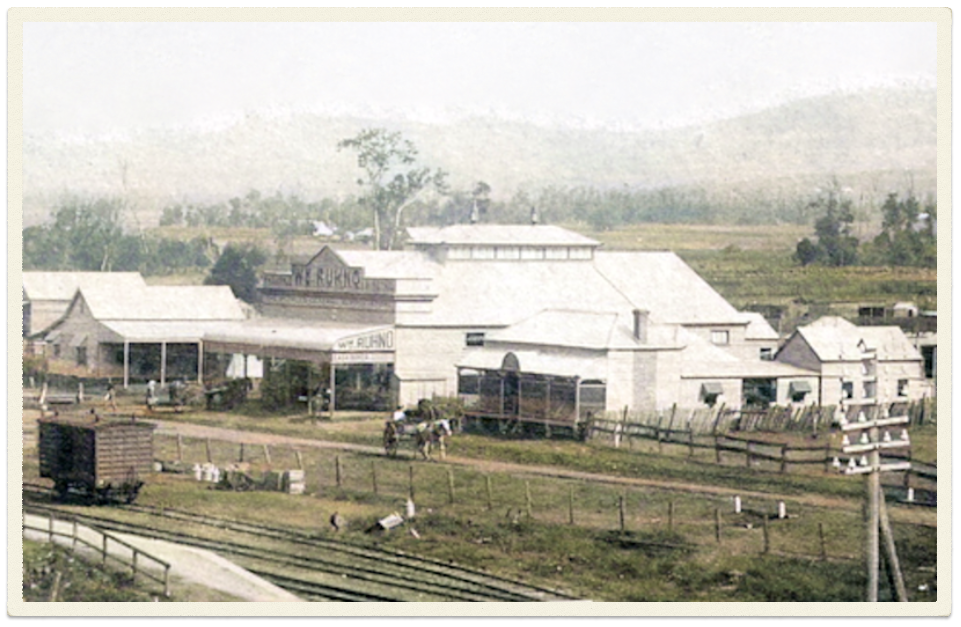
Rosewood History
Ruhno’s Store
“This business must surely be of historical significance in the story of Rosewood. As a child I can well remember a trip to Rosewood would include a visit to Ruhno’s which seemed to sell produce, groceries, haberdashery and everything in between. I can recall George Harding in his white apron; Mrs Innes in the cashier’s box up high in the store. A visit to Ruhno’s was a fascinating experience. I believe this business would be historically important in the history of Queensland.” – Ed
“It is quite disappointing that neither the Rosewood Shire Council, the Moreton Shire Council, or the Ipswich City Council has shown any initiative to formally name any public space in recognition of the Ruhno family in the Rosewood district, particularly given the significance of the old store in Railway St and also the contributions to the business community by William F. Ruhno.” – Rocky
The words of Ed and Rocky must surely resonate amongst those good people of Rosewood who had first hand experience of shopping at Ruhno’s, and who knew the importance of a such a store to the lives of the residents of the town and district. Going way back in time, thousand of families relied upon, and walked through the door of that store right back to 1882, although the name “Ruhno” was not written on its facade until 1st December 1907.
The first General Store was situated on the corner of Albert Street and Railway Street, Rosewood, opposite the railway station. It was built by George Whitney, Grocer and General Dealer from Mt Walker. George came to Queensland with his parents when he was nine, and for several years the family lived at Mount Brisbane Station which was owned by the Bigge brothers. He had a store at Ebenezer and married Mary Hockey from Mount Walker.
Whitney’s Rosewood store opened in March 1882, when he bought the acre of land on which it stood from John William Vance. The strip of land ran from Railway Street, up Albert Street, to what was then known as Vance Lane (now Royal George Lane). Whitney advertised: I will take orders and deliver goods of the best quality at lowest rates. I also trust, by civility and attention, to merit a share of public patronage. Highest prices given for all kinds of farm and dairy produce.
George Whitney sold the business and in early 1884 and Albert Johnson Vance (after whom Albert Street was named) took over the store and ran it under the name of the “Rosewood Farmers’ Produce Agency”. We supply maize, hay and chaff, butter and eggs etc at lowest prices. Quotations given by letter or wire.
George Whitney entered the Post and Telegraph Department and was sent to Blackall as Postmaster.
Mr Charles Nathaniel Schureck, Storekeeper, sold his Laidley business and took on the General Store in March 1886 after Albert Vance became insolvent. Albert then became a railway guard.
Charles Schureck employed Charles Eyre as his book-keeper. It was then called the “Rosewood Gate Stores” and Schureck intended to carry on the business as a General Storekeeper and by strict attention to business, hopes to merit a Fair share of support. Goods are sold at Brisbane prices for Cash and all descriptions of produce purchased for cash.
In June 1887, Messrs Frederick Christopher Emmott & Co purchased the business from Mr Schureck. This gentlemen said he would afford all farmers and other produce dealers a ready cash and reliable market for butter, eggs, corn and other such articles at the highest quotations.
In September the next year a correspondent from the newspaper reported: Having occasion to visit Rosewood, last week, I was agreeably surprised to find such a large town ship. I had often heard of Rosewood Scrub, and had pictured an hotel and blacksmith’s shop, and, possibly, three or four houses, but, instead, on stepping out of the carriage, Mr. Emmott’s general store and drapery warehouse caught my eye. He seems to have a first-class assortment of all kinds of goods.
In October, 1888 F. C. Emmott & Co disposed of the business to Mr. J. L. Frederich of Marburg who purchased the property (land, store and business). Emmott went on to run a dairy and butter factory in the Lanefield area. John Frederich took over on 1st November and closed the store for three days for stock taking before he commenced business.
German born Johannes (John) Ludwig Frederich J. P., was a General Storekeeper and Produce Merchant at Marburg. He hired William Frederick Ruhno, the son of a dairyman from the Condamine, to work in his Marburg store in 1884. Frederich had two other branches of his business at Minden and Hatton Vale. Four years later he closed those two branches and opened one in Rosewood and appointed William Ruhno as manager of the Rosewood Store.
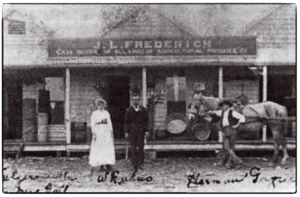
Photo above: Thought to have been Frederich’s first store in Rosewood.
William Ruhno was born at Dalby, Queensland. He married Euphemia Margaret Gray, also from Dalby, in 1889 and bought her back to Rosewood where they made their home in a house next door to the store (see  main photo).
main photo).
In December, 1896 William applied for a Queensland Wine License so he could sell wine at the store. In 1897 Willam Ruhno and Joseph Hudson were listed as Licensing Justices.
John Frederich and William Ruhno were men who could be remembered for setting a good example to young men by showing what could be done by energy and perseverance, and for having the welfare of the district at heart. They worked hard to build the business by catering for the wants and needs of their numerous customers.
Both the Marburg and the Rosewood stores were very successful. They were stocked with an assortment of goods comprising almost everything a householder might need such as fruits, nuts, cordials and assorted table fruits. They also carried specialties and had a large stock of greeting cards, fireworks and toys, mechanical and otherwise, household goods and much more. At the Rosewood store, a shilling table was always the centre of attraction at Christmas time.
John Frederich decided to expand the business and build a new bigger and better store. In December 1899, Mr. George Brockwell Gill, the architect who designed the Queensland Times building in Ipswich, received tenders for the erection of a large store and fittings at Rosewood for Mr. J. L. Frederich. Messrs Hastie and Halliwell’s tender of £690, with a build time of four months, was accepted.

On 7 June 1900, the Queensland Times, Ipswich Herald and General Advertiser announced:
The commodious premises erected, by Messrs. Hastie and Halliwell, of your town, to the order of Mr. J. L. Frederich, are now completed. The building, which is to serve as a drapery and grocery establishment, with a large bulk store at the rear, has been erected on the site of the former one, directly facing the railway station. It is a very decided improvement to the township, and serves to show the importance of the trade done in this district. The length of the structure is 72ft. by 45ft., height of walls 18ft.; the walls and frame being of first-class hardwood. The building is supported on 154 blocks, some of them being dowelled on to thick planks to prevent the superstructure from sinking. The roof is a principal one, and has a large lantern top. The sashes for the lantern light are of cedar, and the glass is protected by galvanised wire netting. The lining and ceiling are of dressed pine with ventilators fixed in the latter. Ventilation is also secured by means of Boyle’s patent ventilator from the roof and also a fanlight in the side of the building framed in cedar and also protected by wire netting. The shop has a large parapet front and a 12ft. awning over the footpath. The front windows are of the very best plate glass, protected by wire guards. The main roof and the roof over the lantern are covered with 24 gauge corrugated iron and the awnings with similar curved iron. The store is properly fitted throughout with fine shelving and counter provided with numerous small drawers. The cashier’s office is of tongued and grooved pine, finished with balusters and moulded capping, also of pine, and contains a desk fitted with a burglar’s alarm till. The exterior of the building is painted with three coats of paint, except in the case of the weather boards, and the interior fixings, office, &c., are varnished with best copal varnish. The premises are well drained with earthenware glazed drain-pipes, and the footpath under the awning has been asphalted by Mr. B. Hedge. An awning 12ft. square has also been erected over the door of the bulk store, and will serve as a protection during wet weather. The plumbing was done by Mr. J. Cuthbert, of Ipswich, and the painting by Mr. H. Catlow, also of Ipswich. As before stated, the contractors are Messrs. Hastie and Halliwell. They also supplied all their own joinery work, and the whole structure 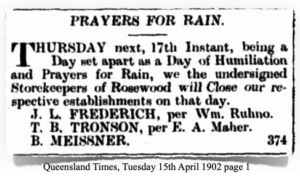 reflects very great credit upon their workman ship and upon the skill of the architect, Mr. G. B. Gill, of Ipswich. The business has meanwhile been carried on in the Victoria Hall, but I am informed that the manager, Mr. Ruhno, intends removing to the new premises next week. The Victoria Hall has thus been occupied for four or five months past, and, in consequence, there has been a lack of amusement.
reflects very great credit upon their workman ship and upon the skill of the architect, Mr. G. B. Gill, of Ipswich. The business has meanwhile been carried on in the Victoria Hall, but I am informed that the manager, Mr. Ruhno, intends removing to the new premises next week. The Victoria Hall has thus been occupied for four or five months past, and, in consequence, there has been a lack of amusement.
In September 1900 carbide lighting was installed. Frederich’s store and Collett’s Rosewood Bakery were the first places to to be lit by gas lighting. It was a distinct advance on the old method of lighting.
The store catered for all sorts of necessities. e.g. In April 1901 when Miss Ellen Lane, eldest daughter of Mr. and Mrs. Charles Lane, “Orange Grove” married Mr. Edward Morgan, of Maryborough, the dresses of the bride and bridesmaids and millinery were made at the establishment of Mr. J. L. Frederich.
WAR SOUVENIRS.
Some interesting mementos of the Boer War are at present on view in the large drapery window of Mr. J. L. Frederich’s establishment. These comprise several Mauser bullets, with and without jagged points, a soft-nosed bullet, and a pom pom shell. These “relics” are the property of Mr. Charles Pickering, who joined one of the contingents for service in South Africa, and who since his return has become an employee of the firm above mentioned. [Q.T. 19 November, 1901]
On the 1 December 1907, John Frederich sold the store to William Ruhno. It was then known as the “The People’s General Supply Store” and traded in produce, machinery, furniture and all other goods previously mentioned.
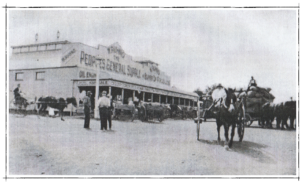
The People’s General Supply Store offered a wide variety of goods in different areas of the store. Before these kind of department stores appeared, when a customer entered a store they felt an unspoken obligation to buy something and browsing wasn’t encouraged. Most shops sold products that were produced by hand, and in small batches. Customers had very few opportunities to feel a piece of material or touch an interesting item because the goods were kept behind the counter and stacked on shelves. Women especially enjoyed being able to shop together in Rhunos and discuss their prospective purchases. The space inside of Ruhno’s store allowed the adornment of various displays of goods in a glamorous and enticing manner, both inside the store and in the large glass display windows on full view at all times to an admiring public. These displays could be an arrangement of handkerchiefs, tablecloths, fabric, lingerie, the latest fashionable item of clothing or furniture, a new clock or radio, a new remedy for an ailment or new brand of soap, wind up mechanical toys or Lipton tea bags or a combination of any or all. Sporting trophies and medals of interest to local residents could also claim a spot in the window. Not only did they sell these items but they also donated medals and trophies for local sporting and other events. A large range of homewares, haberdashery, millinery, wallets and handbags were in stock. A Tailor and Dressmaker were employed. They stocked produce and were agents for farm machinery, pumps etc.
Successful displays encouraged people to buy items they did not know they needed until they saw them on show. It was important to the customers that they could trust the staff’s word as “experts” when asking about a product and get helpful service.
On Saturday, 14 March 1908 one of the largest floods for fifteen years inundated Rosewood. When the residents woke that morning they were surprised at how suddenly the water had risen. In front of Ruhno’s store the water was waist deep in parts. It also flowed across the railway line, covering the line in places. The main street looked like a river with water flowing over the footpaths into some of the shops. It disappeared as suddenly as it rose and had cleared by Sunday morning. The build up of water was the result of the overflow from Mason’s gully.
Every Christmas, on the last day of trading before Christmas Day, it was customary for the store to be besieged by a strong band of juveniles as a result of Santa Claus visiting the store. In December 1908, William advertised:-
Tomorrow will be Christmas Eve, and throughout the day and evening the assistants at the establishment of Mr. W. Ruhno, Rosewood will, to the accompaniment of blaring trumpets, shrill whistles and squeaking balloons blown up by happy youngsters, be busily engaged in the arduous work of satisfying the varied wants of many children of the Rosewood district. With each succeeding Christmas, better facilities so far as the young folk are affected – are provided for merry-making; and Mr Ruhno has in stock such an assortment of whistles, balloons, trumpets and other “musical instruments” as will readily appeal to the many young customers. A splendid collection of toys is also on view, and the ingenuity of their construction should fill not a few juveniles with a desire for ownership. In all other departments there are fine ranges of wares, the quality of which are already known by the residents of Rosewood.
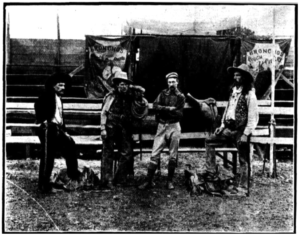 It isn’t surprising that the business had its share of problems with non payment for goods and services. At the Ipswich Police Court in September 1909, William Ruhno sued George Silvann Looper trading as “Broncho George” (proprietor of the buckjumping show held at B. Martoo’s Sports Ground, Limestone Street), for non payment of goods and delivery costs. A judgement of £4 17s 6d was obtained for Ruhno and the bailiff took possession of certain of Bronco George’s live stock.
It isn’t surprising that the business had its share of problems with non payment for goods and services. At the Ipswich Police Court in September 1909, William Ruhno sued George Silvann Looper trading as “Broncho George” (proprietor of the buckjumping show held at B. Martoo’s Sports Ground, Limestone Street), for non payment of goods and delivery costs. A judgement of £4 17s 6d was obtained for Ruhno and the bailiff took possession of certain of Bronco George’s live stock.
By October they were back in court. Apparently a man named David Hardie of Sydney had stepped in and paid the Court the amount due to Ruhno and the costs of the case on behalf of Bronco George. Mr. Summerville, Hardie’s solicitor, presented a stock mortgage and bill-of-sale (registered in NSW) for the seized stock claiming they were Hardie’s property.
Acting on Mr. Ruhno’s behalf, Cardew & Simpson’s solicitor said there was no evidence that the document presented applied to the stock which had been seized by the bailiff and, as the document was not registered in Queensland, Hardie had no right to the stock which had been seized by the bailiff.
Mr. Summerville stated that Mr. Ruhno had no right to keep Hardie’s stock out of New South Wales.
The Police Magistrate concluded that a bill-of-sale was operative only in State in which the document was registered. He therefore decided in favour of William Ruhno, and ordered that the money paid into Court by Mr Hardie should be paid to Mr Ruhno, and that Mr Hardie should also pay £1/1- professional costs.
William Ruhno entered into a partnership with Edward Alphonsus Maher about 1912. They were both members of the Chamber of Commerce and William was President for some years.
Mr. Maher had formerly been manager of Thomas Bleakley Tronson’s drapery store in Rosewood for eight years. Mr. Tronson sold the store in March 1907, at which time Mr. Maher was forced to pursue other ventures. He went to Dalby for a while until, in June 1909, his wife took the license of the Rosewood Hotel and he was granted the billiard license there. In July 1910 Edward Maher bought a sawmill in Rosewood.
The names “Ruhno and Maher” first appear together in 1912 as property agents and auctioneers and storekeepers. There is one reference to Ruhno and Maher’s sawmill in 1913, however the Directories and Almanacs only list E. A. Maher as the proprietor.

Their advertisements were frequently seen on the front page of the Rosewood Register and Marburg Mail with slogans such as “The Big Traders of Rosewood” and “The leading storekeepers of Rosewood are always at the front”.
In 1913 Edward Manttan, a carter working for Ruhno and Maher, received a nasty gash in the fleshy part of the hand while unloading goods for the store. The wound, caused by a piece of hoop-iron was attended by Dr. Wallace. In November the next year Manttan was injured again when his wagon which was being pulled by 2 horses was descending the steep hill near Mrs G. Keate’s property at Kunkala. The brake failed and the out of control horses caused him to be thrown to the ground. He was severely bruised and shaken. Luckily the horses were stopped by P. Keate as one of the wagon wheels had broken. Edward was taken to Rosewood and seen by Dr Hurrey.
Ruhno and Maher made considerable improvements to the store in 1915.
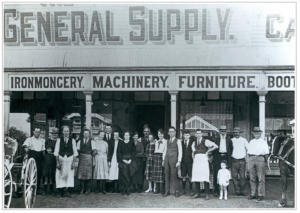
The photo above was taken c.1915. William F. Ruhno is in the centre back. Norman Ruhno is leaning against the post.
Next to him on the left is George Harding in the waistcoat. Jack Wyatt is 4th from right in an apron.
At this time it was the largest country store in Australia.
By now WW1 was devastating the world. In September 1916, even though William Ruhno was born in Queensland, Australia, he, along with two German farmers from the Rosewood district, were classed as Aliens and were interned as German Prisoners of War at Holsworthy Concentration Camp, New South Wales. In May 1917, a man named George Simon was fined £20 for throwing a brick through a plate glass window at Ruhno and Maher’s store. The incident was possibly related to Ruhno wrongly being identified as a German.
William Ruhno was finally released from the internment camp in September 1919. Due to restrictions in travel caused by the Spanish Flu Pandemic he could not return to Rosewood immediately. Once home, he decided to wait until the New Year to return to work.
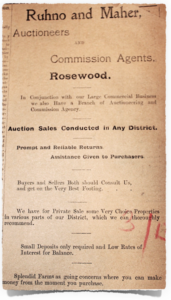 A few days after Christmas Day (29th), in 1919, the store was robbed.
A few days after Christmas Day (29th), in 1919, the store was robbed.
Rosewood, Monday. A daring burglary was enacted at Rosewood last night, when Messrs. Ruhno and Maher’s establishment was entered. The safe was blown open, and between £200 and £300 extracted. This is the first time that an incident of this nature has occurred in Rosewood, and the affair has created a great sensation. The discovery was made by one of the employees (M. J. O’Reilly) who noticed the side door partly open, early this morning, and, on investigating, made the discovery. Bags of flour, supported by a network of boot laces, were plied around the safe to deaden the sound of the explosion while the keyhole had been filled. An opportune time was chosen for the deed, as the takings if Christmas Eve and Saturday had been deposited in the safe, owing to the bank holiday. The intruders were evidently disturbed before a thorough search was made of the safe. Fortunately, several bags of money, which had been.placed behind the books, were undisturbed. The tools used were strewn about the safe. The police have the matter in hand. The services of an officer of the CI. Branch, from Brisbane, has been secured.
Read an article about the robbery here and the Hearing.
The following Sunday night two boys who were passing through the Rifle Range paddock found the safe with a number of cheques left tied in a neat roll inside. Then on 18th January 1921, Frederick John Noble, alias Hunter, was arrested near Laidley for the crime. He had a history of theft but was released on a point of admissibility of evidence.
The partnership ‘Ruhno and Maher” continued until 1922. William Ruhno bought the stock-in trade of the firm Ruhno and Maher from Edward Maher and carried on the business in his own name as of 1st January. He was assisted by his son Norman. The sale included the property agent and auctioneer part of the business. Mr Maher moved to Brisbane and started a grocery business at Sherwood Road, Sherwood.
On the night of the 4th May 1922 thieves broke into the store. They used a ladder placed at one of the back windows and stole a quantity of muslin and other materials after rummaging around seemingly looking for something in particular. Arthur Loveday, the firm’s accountant, made the discovery.
It is believed the same burglars struck again on the night of the 20th June at Ruhno’s emporium. It seems that Arthur Loveday was usually first on deck at the store, as once again he was the person who discovered large quantities of corn and wheat strewn across the floor. He found that a hole had been cut in the door to the produce room. The thief had put his hand through the hole and removed the iron bar which was giving extra security to the door. After emptying the contents of the bags of maize and wheat, the burglars used them to carry away their spoils (estimated value being £500) from the drapery and tobacco departments. A townsman saw a number of people in a car travelling towards Ipswich in the early hours of that morning.
Ruhno’s general store had grown along with the progress of the district. In 1923, The People’s General Supply Store was described as “one of the largest wooden structures of its kind in Queensland for over 30 years”. His son Norman (William Norman) controlled the produce, grocery, ironmongery and crockery departments and Mrs Ruhno controlled the ladies’ departments. William Ruhno dealt extensively with the farmers and knew the district thoroughly. He was very loud in his praise of the vast resources of the Rosewood district and its fertile soil. In the interest of improving the land, he arranged with a well-borer, with a large plant, to come to the Rosewood District and invited anyone interested to be involved.
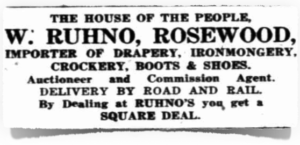 Ruhno’s advertisements referred to his store as being “The House of Quality” and “The House of The People” where you would get a “square deal”. “Service and Quality First”; “Good Service and Honest Values in Every Department”; “Ruhno’s For Everything”; “Phone 15”; “If I please you, tell others. If I don’t, please tell me”.
Ruhno’s advertisements referred to his store as being “The House of Quality” and “The House of The People” where you would get a “square deal”. “Service and Quality First”; “Good Service and Honest Values in Every Department”; “Ruhno’s For Everything”; “Phone 15”; “If I please you, tell others. If I don’t, please tell me”.
In November 1923, a “sensational bolt” occurred at Ruhnos. Mr. Walter Loveday’s team of horses, attached to a large waggon, took fright and bolted from the storage shed towards the gates which were completely torn away by them. One of the animals was severely cut.
On the 4th September 1926, the store was robbed of goods to the value of £60. Four suits of clothes, four pairs of boots, 2 pairs shoes and a big quantity of silk hosiery were amongst the things which were missing. It appeared that the window had been broken by someone standing on the tank, thus allowing the thieves to enter. Four men were arrested and all of the goods were recovered.
In July 1928 James Harding, an employee at Ruhno’s, was thrown from a delivery cart and sustained severe bruises on the face and other injuries as a result. The cart capsized when it ran over a rough rut on Harding’s Hill. The horse bolted, but was caught before any further damage was done. James was admitted to a private hospital and attended by Dr. Wallace.
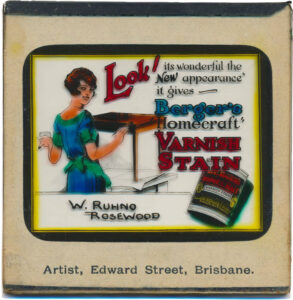 In September 1929, the Ruhnos left by the S. S. Nieuw Holland for a holiday trip to Colombo and the East for 6 weeks. His employees at the store gave him a send-off.
In September 1929, the Ruhnos left by the S. S. Nieuw Holland for a holiday trip to Colombo and the East for 6 weeks. His employees at the store gave him a send-off.
ROSEWOOD, Saturday 21st September. Bon Voyage to Mr. Ruhno – In honour of their esteemed chief, Mr. Ruhno. who leaves by the Nieuw Holland on Monday for a holiday trip to Colombo, the employees of the firm tendered him a bon voyage supper at the White Rose Cafe on Thursday night. A very pleasant evening was spent by the party. Mr. J. Wyatt, who presided, proposed the toast, “The Guest of the Evening.” Referring to Mr. Ruhno’s proposed trip, he said he was a hard-working man, and no one would begrudge him a holiday, which he trusted would also be beneficial to his health. They all wished Mr. Ruhno well, and on his return would he ready to welcome him back. Mr. S. Edwards wished Mr. Ruhno a happy and enjoyable time on his well-earned holiday, and assured him that the staff would carry on the good work with the same zeal during his absence as before it. Mr. Jos. Potts said he was very pleased to be present to honour Mr. Ruhno, whom he wished an enjoyable holiday and a safe return. The toast was accorded musical honours. Mr. Ruhno, responding, said he was pleased to be present and appreciated very much indeed the kindly thought that prompted them to tender him a send-off. He did feel, he said, that he had a jolly good staff and that he was proud of them. He was satisfied that they would do their utmost during his absence. He was looking forward with pleasure to the trip. He wished each one good health and said he looked upon them all with a higher and friendlier feeling than as simply members of the staff. The Chairman presented Mr. Ruhno with a Swan fountain pen, with the staff’s cordial wishes. Acknowledging the gift, Mr. Ruhno said he would value it for the kindly thought and spirit in which it was given. The toast, “The Visitors,” proposed by Mr. S. Edwards, was acknowledged by Mr. Norman Ruhno, while later proposed “The Chairman.” A musical programme was given, the items being: Overture, Miss D. Edwards: solo, Mrs. A. M. Imrie; cornet solo. Mr. Jos. Potts; solo, Mr. J. T. Wyatt: piano-mandolin selection, Miss D. Edwvards and Mr. S. Edwards: vocal duo, Mrs. Imrie and Mr. J. Wyatt: pianoforte duet, Misses D. Edwards and E. Hogan. The singing of ‘Auld Lang Syne” terminated a pleasant function. Those present, in addition to the guest of honour, were: Mesdames W’. Ruhno, Swan, E. S. Innes. A. M. Imrie, Misses D. Edwards and E.Hogan. Messrs. N. Ruhno, T. Wyatt. Jos. Potts, and L. Edwards.
Attempts were made to enter Ruhno’s and Sellars and Co.’s shops in October 1935. Windows were partly raised in both stores but entry was not gained in either.
William Frederick Ruhno died at his home on the 3 September 1938. Mrs Ruhno took over running the business and was assisted by her son Norman and his wife.
On Sunday evening the 21st January 1940 a storm of cyclonic force that only lasted 10 minutes spread havoc among townships, farms, and crops in the Rosewood district. Ruhno’s 72 ft. long store partially collapsed and the galvanised iron roof was blown off, its sheets being distributed over a wide area. It was repaired as quickly as possible.
William’s wife, Euphemia Ruhno, died in 1941. At the age of 73, she was still able to move across the various departments of the store until 10 days before her death.
Norman Ruhno and his wife Leila continued running the business. On the night of the 3rd June 1946, Norman’s Chevrolet 3-4 ton truck was stolen from the garage at his store. George Harding found it missing when he arrived at work the next morning. Sergeant H. Wacker, officer in charge of the Rosewood Police Station, was notified and began inquiries. Information regarding the stolen truck was circulated to police stations as far as the border. The 1944 model was described as being a dull red-brown colour with staked sides and registration number Q384868. A motor bike owned by a boarder at the Rosewood Hotel was also stolen from the garage at the rear of the hotel that night. The thieves wheeled it through Ruhno’s yard to Albert-street, where it was seen by several people even though none of them thought any thing of it. The thieves left the bike and took the truck instead. Some of the residents reported hearing the truck travelling along Albert-street. It was reported that about two miles outside of Rosewood, the culprits stopped at a farmhouse to ask for directions. They also called at the Plainland Hotel on the way to Toowoomba. On hearing this, Norman Ruhno drove to Toowoomba in the hope of finding the truck abandoned on the side of the road. Unfortunately this wasn’t the case. It was recovered on the 9th June near the railway line at Gatton. A resident of Gatton who heard about the theft, contacted Norman.
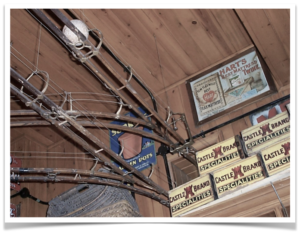 Norman died in 1960 aged 62 years and Lloyd, his son, took over the business assisted by his mother.
Norman died in 1960 aged 62 years and Lloyd, his son, took over the business assisted by his mother.
A multitude of people would have remembered visiting Ruhno’s department store and seeing the “Cash Carry” system that whizzed customer’s cash payments and invoices around to the cash office. They had two types of these over the years. The first was a system of two piece hollow wooden balls in which cash and dockets were placed before the balls ran along sloping rails to the cashier and later a system where a carriage was suspended on pulleys which ran along a wire from the sales desk to the cashier’s station. All of the items from Runho’s store were purchased in pounds shillings and pence until the introduction of decimal currency on the 14th February 1966.
The store was destroyed by fire on the 10th April 1979. Read about it here.
Some known employees
(1890s) William Donald, Frederick John Dutney (Accountant)
(1900s) William Dölling, James Rogers, Charles Pickering, Frederick John Dutney (Clerk)
(1910s) Miss Hannah Lane, Mr. J. B. Farrell, Edward John “Jack” Hogan, Miss Vera Crowther, E. Manttan (Carter); Sarah Evans. F. J. Dutney (Chief Clerk), Mr. H. Clark, Elsie May McLaughlin (Dressmaker), Edith Maud McLaughlin (Dressmaker); Edward Walter Manttan (Carter)
(1920s) Miss Rose Smith (Imrie), M. J. O’Reilly, A. J. Loveday (Firm’s Accountant), Sydney E. Edwards (Grocery Dept); James Harding, J. Sillman, Miss Daisy Allen (Accountant).
(1930s) Messrs. E. Edwards, J. T. Wyatt, and A. R. Blake (Haberdashery), Mrs. E. S. Innes, Miss Doris Edwards, Miss Joyce Bowles, Messrs. N. Ruhno, J. T. Wyatt (Grocery Dept), G. Harding (Grocery Dept),
Joseph Potts, C. Dutney, Ellen Hogan and R. Yarrow.
(1940s) Joseph Potts, Gus Reinke (Truck Driver); Reg Dutney, Dawn MacLachlan Imrie, Girlie Roache (Skinner).
(1950’s) – Doreen Bassett, Eve Neave (Cochrane), Jan Yarrow
Can you help with the names of others who worked at the store? hello@rosewoodpasttimes.com
© Jane Schy, 2024
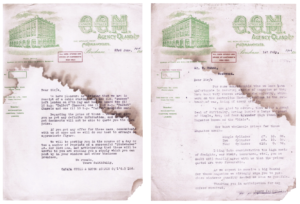
Courtesy of Spencer Yarrow
Sources:
Qld Registry Births, Deaths, Marriages
Trove (National Library Australia)
Queensland Directories & Pughs Almanac
Picture Ipswich – Ipswich Library
Queensland Times on Microfilm – Ipswich Library
The Malcames Collection
